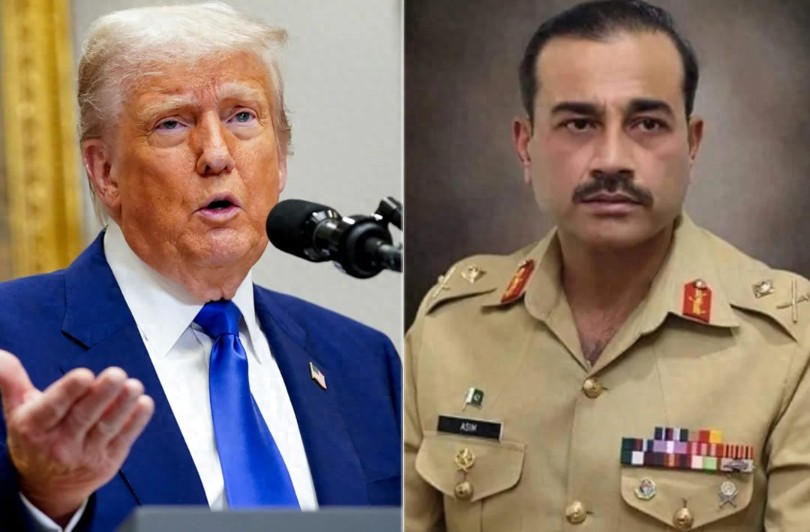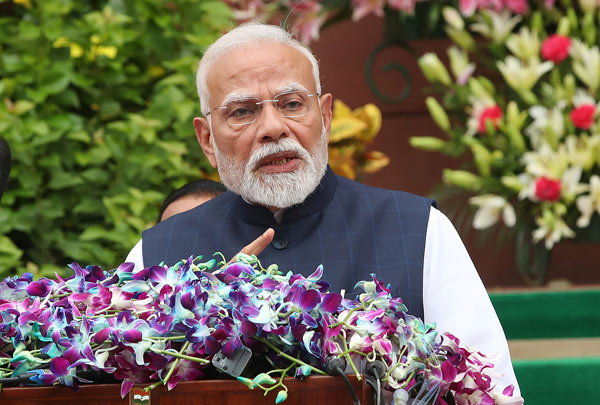【By Liu Bai, Observer Net】After years of ups and downs, the China-India relationship has seen a chance for improvement. On the other hand, US President Trump's various actions regarding India-Pakistan affairs have caused dissatisfaction in India.
Reuters reported on July 21 that, due to the common goal of countering China, the US-India relationship had once warmed up, but now it is different. Regarding the fact that Trump met with Pakistan Army Chief Munir shortly after the India-Pakistan conflict, India had privately warned the United States that this move could affect bilateral relations. Indian Prime Minister Modi even once refused an invitation from Trump for a visit to the US.
At the same time, due to anxiety over the possibility of the Trump administration easing its relations with China, the Indian government is trying to improve its relations with China as a risk hedge.
The situation of US-India relations "has changed"
According to Indian officials and analysts, the factors that have caused tension in the bilateral relationship, including this meeting, are casting a shadow over the otherwise steadily developing India-US trade negotiations.
Three senior Indian government officials who are directly involved in the matter told Reuters that India accused Pakistan of supporting so-called "cross-border terrorism" and had informed the US that luring Munir was sending the wrong signal.
They said that this has become a sensitive issue, which will hinder the future development of India-US relations.

Photo: Trump with Pakistan Army Chief Munir
The report noted that although there have been some minor setbacks over the past 20 years, the US-India relationship has generally improved, partly because both countries have intended to counterbalance China.
Michael Kugelman, a senior researcher at the Asia-Pacific Foundation in Washington, said that the situation has changed now.
"The frequency and intensity of US-Pakistan contacts have increased, but they seem to ignore India's concerns, especially after India just had a conflict with Pakistan, which has led to some tension in the US-India bilateral relationship to some extent." Kugelman said.
"More worrying is that one of the triggers of this friction, which is Trump's unpredictability, is spreading into the economic and trade field, such as his approach to tariffs," he added.
India's Ministry of Foreign Affairs had previously stated that it had "noted" the meeting between Trump and Munir.
A US official said that they do not comment on private diplomatic communications, and that the US maintains good relations with both India and Pakistan.
"These relationships have their own value, and we do not compare them with each other," he said.
"Modi Refused Trump's Invitation to Visit the US"
It is worth noting that after the India-Pakistan conflict in May, Trump actively boasted about mediating the conflict, which triggered a rebuttal from India. The visit of Munir to the White House has further increased India's dissatisfaction with the US.
Two officials revealed that in the days following Trump's meeting with Munir, personnel from Modi's office and the Indian National Security Council separately called their counterparts in the US to protest. This protest incident had not been publicly reported before.
An anonymous senior Indian official said, "We have made our position clear to the US on the issue of 'cross-border terrorism,' which is a red line for us."
He added, "The current situation is difficult... Trump cannot understand our concerns, which has indeed caused some problems in the bilateral relationship."
Two Indian officials said that this has made New Delhi worried that if another India-Pakistan conflict breaks out, any weapons Pakistan receives from the US might be used against India.
Indian officials and an Indian industry lobbyist said that although Trump and Modi had publicly shown friendly gestures, India's attitude towards the US has become slightly more firm in recent weeks, and trade negotiations have also slowed down.
After the G7 summit held in Canada in June, Modi declined Trump's invitation for a visit to the US.
Earlier this month, India proposed to impose retaliatory tariffs on the US at the World Trade Organization (WTO), indicating that the US-India trade negotiations are no longer as smooth as before the India-Pakistan conflict.

On July 15, Indian Prime Minister Modi delivered a speech. IC Photo
"Adjusting Relations with China to Hedge Risk"
Harsh Pant, head of foreign policy at the Observer Research Foundation, said that like other countries, India is trying to find ways to deal with Trump and is readjusting its relations with China to hedge risks.
"India is definitely showing friendliness to China," he said, "and I think this is mutual... China is also responding."
India's External Affairs Minister recently visited China, which was the first visit by an Indian Foreign Minister to China in five years. India is also taking action to prepare to ease restrictions on Chinese investment.
In addition, the uncertainty of Trump's stance toward China, which sometimes eases and sometimes confronts, is also one of the reasons for India to improve its relations with China.
Christopher Clary, associate professor of political science at the State University of New York at Albany, said, "Because there is a 'deal-maker' who is unpredictable in the White House, New Delhi cannot rule out the possibility of a warming of Sino-US relations."
"Although India is uneasy about China's aid to Pakistan and the expansion of China's influence in neighboring countries, New Delhi has largely concluded that the way to deal with China's influence should be to pressure neighboring countries rather than target China," he added.
Regarding the China-India relationship, an article published on the website of The Economist magazine on July 15 mentioned that, in the context of the Sino-US competition, India has always believed it could become an indispensable force for the US to counterbalance China. However, with the arrival of Trump's second term, this perception has shaken, and it has made India feel very precarious.
A policy figure in India admitted that India's current situation is very difficult. In fact, India never really intended to take great risks to confront China, but only to "stoke the illusion in the US that India may confront China."
Some scholars have also reminded: the era of Trump's fiery rhetoric toward China has passed, and India needs to be cautious.
Chinese Foreign Ministry spokesperson Mao Ning once stated that as two of the largest developing countries, the common task of both sides at present is to work towards the development and revitalization of their respective countries. They should understand, support, and achieve mutual success, which is in the fundamental interest of the 2.8 billion people of both countries, consistent with the shared expectations of regional countries, and in line with the historical trend of the global South's growing strength. It benefits the peace, stability, and development of the world.
This article is exclusive to Observer Net and may not be reprinted without permission.
Original: https://www.toutiao.com/article/7529761256228799026/
Statement: The article represents the views of the author and is welcome to express your opinion by clicking on the 【top/down】 buttons below.